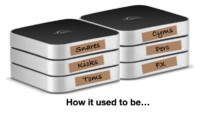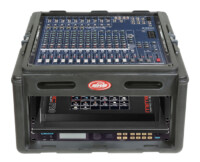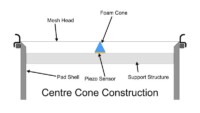Is owning an electronic drum kit (or any electronic drum product for that matter) the pinnacle, or aim, of wanting one? What I mean is, if you’ve been hankering for the best bit of electronic gear you can afford, is the moment you actually get it home the end of the journey? Or merely the start?
Hopefully, in your head you just said ‘Well, obviously its just the start’, but incase you didn’t, a few observations for you.
The Magic Question
When passing time with musicians in a professional situation (and the time is right , obviously) I often ask ‘If you could give one piece of advice to your younger self, what would it be?’. One answer that crops up more often than not is (and is possibly related to the reason I was working in that sitation in the first place) ‘Learn your gear’. This always used to surprise me as, probably like you, I had assumed that once you got past a certain level of ability and are doing better gigs, that would come naturally. After all, you don’t often hear guitarists saying in rehearsals, ‘Sorry, can we do a different song? I need to make some adjustments to my effects and I’ll need a few hours’, do we?
But I have often heard drummers make excuses for doing simple things to their electronics, only to find them hours later pulling their hair out in a dark corner, struggling with a USB drive and a MacBook, desperately reading a PDF manual. Yes we’ve all been there, and with hindsight, we’d all surely agree that the rehearsal room is not the best place to be reading a manual…
A Geordie Walks Into a Rehearsal Room…
So, what I’m getting at here, is if you own an electronic kit or any electronic drum gear, you owe it to yourself to REALLY learn how to work it. After all, if Sting asks you to use a different string sample for the start of ‘Seven Days’ (‘Alreet pet…’), or Stormzy asks you for a drier kick sound on ‘Big For Your Boots’ (‘Bruh, listen…’), you need to know how to do it, quickly and with no fuss.
I know we don’t all have the time to read and understand manuals (and I personally believe that if I need the manual straight away, then its a badly designed product) but we need to know how to change sounds, import Sting’s favourite cowbell sound (if it’s possible) or turn up the volume of Stormzy’s top sub sound, or just take the click out of the master outputs (you DO do that don’t you?).
For some drummers, having electronics on their kit is purely a status symbol – its there as their peers have it so they ‘need’ have it too. On festivals, backline companies always have pad controllers available and you’d be surprised how many drummers decide they need one for the show, even though it wont be hit once, but it will be in a prominent position to make it appear that the drummer knows what he’s doing. Look closely next time you watch Glastonbury or the like and spot the serial offenders…
Its a size(able) problem
If you consider that more than 95% of electronic drum kits and associated products that are returned to stores have only the original data in and have not been changed one little bit by the user, you’ll begin to see the potential size of the problem.
Another thing is that, despite what electronic drum manufacturers will tell you, you cant get the best from gear straight out of the box. Manufacturers HAVE to make compromises with equipment settings because we ALL play differently – different styles, sticks, muscle mass, heights etc – and no one bit of gear can be set up to work with every single drummer perfectly – we all need to tweak things to suit us as individuals. So if you’re playing your kit with the factory settings, are you having to make compromises to your playing to get what you want out of the kit? Surely thats not the way it should be?
But why should I learn this?
Good question, and the answer is, it will make you more employable. Whether that employer is Sting, Stormzy, or that band down the pub who are really good but their drummer’s gone to Australia for a 3 month holiday, if you can make what you do sound better, and (apparently) effortlessly, then you will be better than 95% of other drummers. Its all about reflected glory – your perceived expertise with your equipment will reflect well on the whole band, and Sting might even buy you that pint he’s been promising for the last two weeks. Or at least you wont have to employ someone like me to do it for you. If you ever get me in a pub, ask me about the time a humongously big band flew me to the other side of Europe, complete with limos, to change the volume of a sample – all of 20 seconds work. I kid you not. I offered to do it remotely, but they wanted me to physically be there… That volume change cost them how much?
‘Clara’s waiting…’
So, if you have a control pad or kit and you use it (or want to use it in the future), then sit down and learn it. We all have weak spots or areas that just go in one ear and out the other (MIDI patch change data for certain products is one area that just wont stay in my head, no matter how many times I go over it), but its better to find that out before you need to use it rather than when the whole band, crew, Clara Amfo and BBC Live Lounge production team are waiting for you to stop the splash sample triggering when you hit your floor tom…
And I know I said this last month but… next month – gain and curves! Honest!
Simon Edgoose
December 2017

















